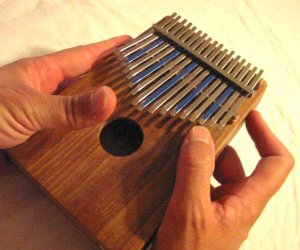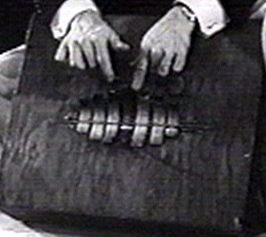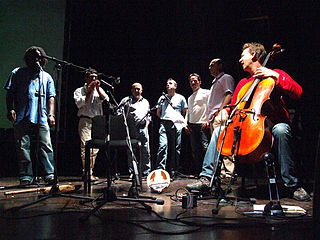External links
- "Mbira", by N. Scott Robinson
The ilimba is a lamellophone from Tanzania. It is a traditional instrument of the Gogo ethnic group and its most famous player in the 20th century was Hukwe Zawose, who developed a version of the instrument with between 66 and 72 metal keys.
The instrument is similar to the Zimbabwean mbira but larger, and is tuned to intervals derived from the overtone series.

Mbira are a family of musical instruments, traditional to the Shona people of Zimbabwe. They consist of a wooden board with attached staggered metal tines, played by holding the instrument in the hands and plucking the tines with the thumbs, the right forefinger, and sometimes the left forefinger. Musicologists classify it as a lamellaphone, part of the plucked idiophone family of musical instruments. In Eastern and Southern Africa, there are many kinds of mbira, often accompanied by the hosho, a percussion instrument. It is often an important instrument played at religious ceremonies, weddings, and other social gatherings. The "Art of crafting and playing Mbira/Sansi, the finger-plucking traditional musical instrument in Malawi and Zimbabwe" was added to the UNESCO Representative List of the Intangible Cultural Heritage of Humanity in 2020.

An idiophone is any musical instrument that creates sound primarily by the vibration of the instrument itself, without the use of air flow, strings (chordophones), membranes (membranophones) or electricity (electrophones). It is the first of the four main divisions in the original Hornbostel–Sachs system of musical instrument classification. The early classification of Victor-Charles Mahillon called this group of instruments autophones. The most common are struck idiophones, or concussion idiophones, which are made to vibrate by being struck, either directly with a stick or hand or indirectly, with scraping or shaking motions. Various types of bells fall into both categories. A common plucked idiophone is the Jew's harp.

A lamellophone is a member of the family of musical instruments that makes its sound by a thin vibrating plate called a lamella or tongue, which is fixed at one end and has the other end free. When the musician depresses the free end of a plate with a finger or fingernail, and then allows the finger to slip off, the released plate vibrates. An instrument may have a single tongue or a series of multiple tongues.

The marímbula is a plucked box musical instrument of the Caribbean. In Cuba it is common in the changüí genre, as well as old styles of son. In Mexico, where it is known as marimbol is played in son jarocho; in the Dominican Republic, where it is known as marimba, it is played in merengue típico, and in Jamaica it is known as rumba box and played in mento.

Growing Up Live is a concert film by Hamish Hamilton and Peter Gabriel. It features a live performance from Gabriel's 2003 "Growing Up" tour. The concert is notable for its dynamic set design by Robert Lepage. Also of note is the addition of Melanie Gabriel, his daughter, for backing vocals in this concert footage. Bonus features include Tony Levin's photo album selections and an interview with Peter Gabriel about the story of Growing Up.

The International Library of African Music (ILAM) is an organization dedicated to the preservation and study of African music. Seated in Grahamstown, South Africa, ILAM is attached to the Music Department at Rhodes University and coordinates its Ethnomusicology Programme which offers undergraduate and post-graduate degrees in Ethnomusicology that include training in performance of African music. ILAM, as the largest repository of indigenous African music, is particularly known for its study of the lamellophone mbira of Zimbabwe and Mozambique, as well as the Chopi people's Timbila, a variant of the marimba from southern Mozambique.

Andrew Tracey is a South African ethnomusicologist, promoter of African music, composer, folk singer, band leader, and actor. His father, Hugh Tracey (1903–1977), pioneered the study of traditional African music in the 1920s–1970s, created the International Library of African Music (ILAM) in 1954, and started the company African Musical Instruments (AMI) which manufactured the first commercial kalimbas in the 1950s.
Hukwe Ubi Zawose was a prominent Tanzanian musician. He was a member of the Gogo ethnic group and played the ilimba, a large lamellophone similar to the mbira, as well as several other traditional instruments. He was also a highly regarded singer.

Mola Sylla is a Senegalese musician. He moved to Europe in 1987 and lives in Amsterdam, Netherlands. He is a singer and plays such traditional African instruments as the mbira, kongoma, xalam, and kalimba.
The agidigbo or ‘’’molo’’’ is a large traditional plucked lamellophone thumb piano used by the Yoruba people of Nigeria to play apala music.
Queen Marimba is a folk hero whose accomplishments have become part of the folklore of Africa. As is customary in most African cultures she is considered to be a god and was one of the immortals. She led the Akamba tribe in East Africa in very ancient times across the Ukambani plains in present day Kenya, stretching across the Kilimanjaro plains in present day Tanzania. There has been scant research done on her and presently the most notable source for information on her life comes from the writings of Vusa'mazulu Credo Mutwa. He asserts in his book; Indaba My Children, that she was the mother of the Akamba people at the time when they were getting to know their Maasai neighbours. Various renditions of his book have been published since the late 60's, including "My People, My Africa", "Indaba My Children" and "Africa Is My Witness."
The malimbe is a type of xylophone from the Congo which is described as having both male and female counterparts; the former has 15 wooden bars, the latter has nine. "Malimbe" also refers to a lamellaphone or mbira type instrument amongst the Nyamwezi of Tanzania.

Ikembe, is a type of musical instrument of the lamellaphone group, common amongst the people of Rwanda, Burundi and the Congo. The instrument consists of several iron lamellae, fixed to a rectangular wooden soundbox.

The matepe is a type of lamellophone played in North-Eastern Zimbabwe. It is primarily played by the Sena Tonga and the Kore-Kore peoples which are subgroups of the Shona people.
A marimba is a xylophone-like percussion instrument played with mallets.
The Bagamoyo Arts and Cultural Institute is a semi-autonomous governmental organisation in Bagamoyo, Tanzania, for training, research and consultancy services in arts and culture. It was established by The United Republic of Tanzania to "encourage the development of Tanzanian arts and Culture, to promote their use as a record of contemporary life and manners, to promote education about film, television and the moving image generally, and their impact on society".

Womadelaide '95 is a compilation album of music by artists from Womadelaide in 1995. The songs were recorded live by ABC Radio sound crews. Bruce Elder from the Sydney Morning Herald wrote that the album was "an extraordinary demonstration of how some of the greatest world music acts are reduced by studio technology, and how immensely better they sound when they perform live." The album was nominated the 1996 ARIA Award for Best World Music Album.
Chibite is an album by the Tanzanian musician Hukwe Zawose, released in 1996. Zawose played the 1995 WOMAD Festival, leading to his association with Peter Gabriel. Chibite was Zawose's first album to be widely distributed.